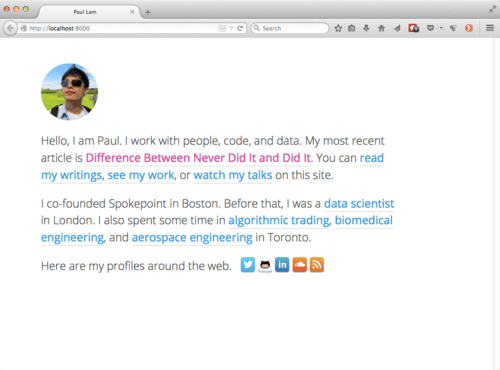I have become a permanent nomad since this Spring and continued my habit of
having coffee chats with startup founders. After traveling through 13 countries
and speaking to dozens of founders, I found myself receiving lots of wisdom
from many amazing people. My friend and mentor Martin suggested that I publish
these gems of knowledge. Here are some of the distilled takeaways from a select
few of my chats. I hope you find these excerpts useful in your own journey.
Thank you very much to everyone that has taken the time to chat with me!
Starting Up
People doing startups are not necessarily the best and brightest. They are
people that can take a lot of risks.
Bradford Cross, CEO of Prismatic
Bradford talked about the Bay Area startup culture with me. My takeaway is that
a solid engineering culture is a necessary condition for any great startups. I
need to learn from the best. So where can I find the best cultures? While it is
trendy to look at places like Airbnb or Uber, I should learn from established
companies like Google and Facebook, which have had the time to develop their
best practices from experience.
The way to distinguish people with empty ideas versus those with real ones is
that those with real ideas have the problems themselves.
Diego Basch, Founder of IndexTank (acquired by LinkedIn)
Diego and I spoke for a couple hours about the right problems to solve and how
to find them. There are two kinds of people to look for inspiration from:
- those that can build, and
- those that have needs but don't know how to build.
People in (1) can usually build what they need themselves. Our job as startup
founders is to find (2). The farther away the problem from tech, the better.
People in these industries have felt the pain and identified a problem to solve
from experience. Look for people with at least a few years experience in an
industry.
Be diligent and ask specific questions when reaching out for information
interviews.
Martin Scholl, co-founder of an unannounced startup
I met up with Martin in Berlin, where he has started a handful of companies in
the past 10 years. Currently, he's working on a tech startup for the art industry. I
asked Martin where he gets his far-fetched but obvious in-hindsight
inspirations from.
Talk to people outside of technology, he told me. Not only that, but he would
spend days studying an expert's area of expertise before speaking to them.
Research papers, academic books, and whatever material that he could get his
hands on. Imagine putting in that amount of work for each outreach. That's why
he said that I should not hesitate to spend an entire year just looking for the
right problems to solve.
People think most of my ideas are ridiculous at first. What actually matters
is: are your users loving it?
Tim Allison, CEO of Darling Dash
I visited Tim in his office in Copenhagen just weeks before they were launching
their next product. Tim recalled the time of his launch of Cupple (acquired by
Tenthbit, January 2013), when all the investors that he pitched to thought his
idea was stupid. Who would want a social network for 2 people?! But he knew
that there was something to it because his users loved it. He listened to them
and executed his vision.
Team Building
Discover the strengths of people that you work with.
Paco Nathan, Director at O'Reilly Learning
Many years ago, Paco was on the management team at a company. There was a star
engineer, who management pulled aside and gave him more responsibility to head
some greenfield projects. He made no progress and Paco was tasked with firing
him. He spoke to the guy and worked with him to discover that he was a
finisher. Paco placed him as the go-to person in the data team, so PhD's would
go ask him for help. The guy excelled and became the "most valuable player"
there, then moved on to do great things.
We document all our communication and processes on Github.
Mårten Gustafson, Technical Director at Schibsted Media Platform
I find the vigorousness of Mårten's approach to improving their engineering
processes fascinating. For example, he uses mind maps to illustrate the cost of software
maintenance. He made me
realize that the same level of critical thinking and data-driven feedback for
businesses can be applied to evolve a company culture too.
Sales
Solve a need. Don't sell the implementation.
Mary Adams, Founder of Smarter Companies
Mary trains consultants on measuring intangible capital for enterprises.
Mary's service was the most abstract business I'd ever heard of. One of my
first questions to her was, How do you sell that?
She asked me to think in the shoes of her target customers. Suppose you are the
CEO of a company like FedEx. And you're trying to raise money for your company.
What are your company's assets? Machinery, people, properties? For FedEx, it's
their logistics processes and operational knowledge. These are all intangible
capital. Her value proposition is attaching numbers to abstract ideas, which is
what her customers are doing in their heads anyway.
"Often the best sales are done when the clients don't even know the name of
your product, and you focus the discussion entirely on the problems they have
and how you can solve them.
Jeff Kaplan, Director of Multilateral and NGO at Socrata
Jeff showed me that good sales means doing hard work. Spend time researching
your potential customer and think about what problems they might have. Given a
typical 30-minute first appointment, you can save precious client time on the
introductory What do you do? question and focus on What problems do you have?
to establish a rapport with the potential customer as quickly as possible.



